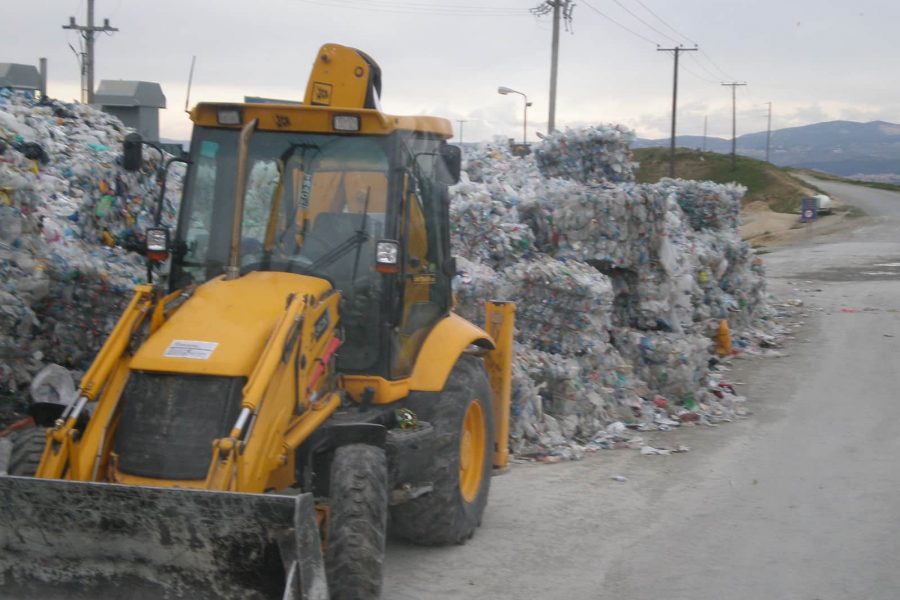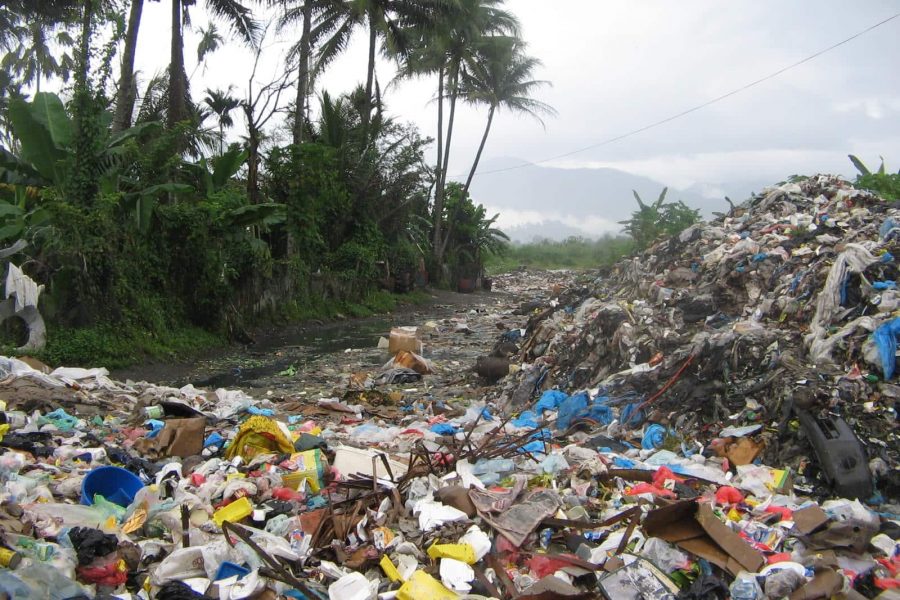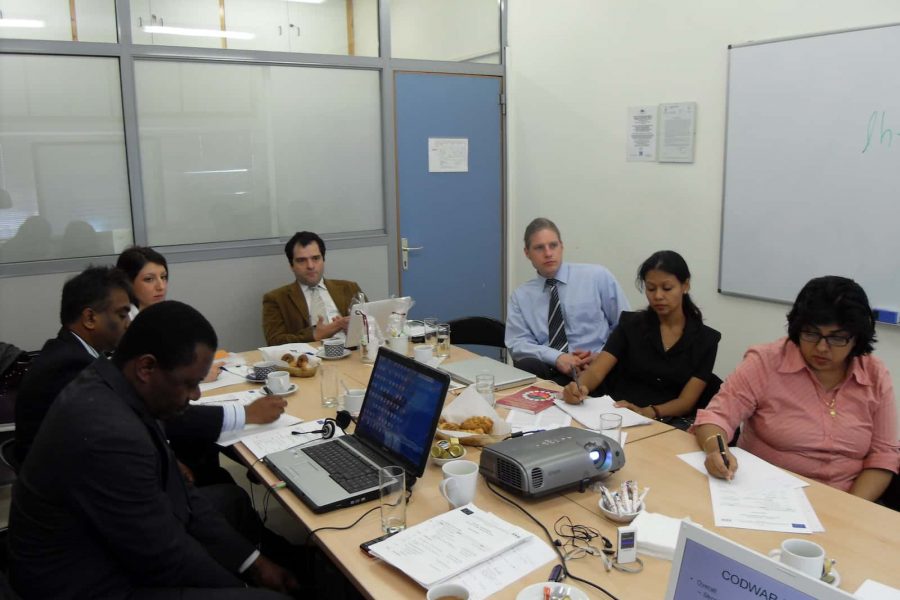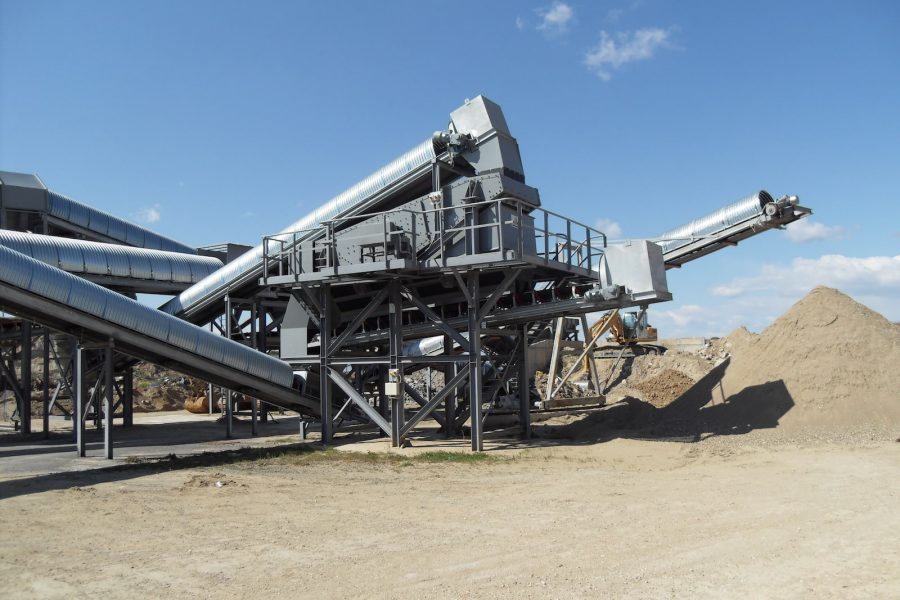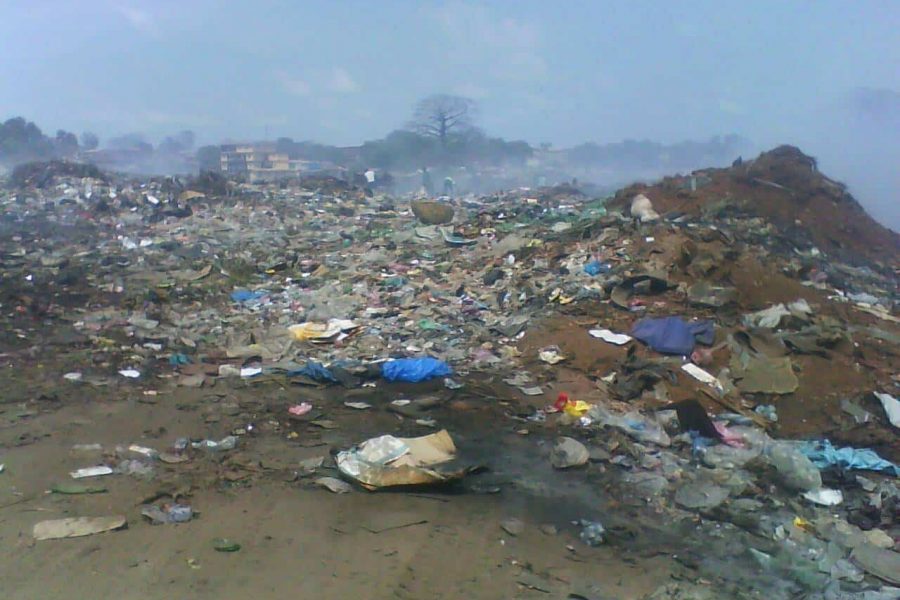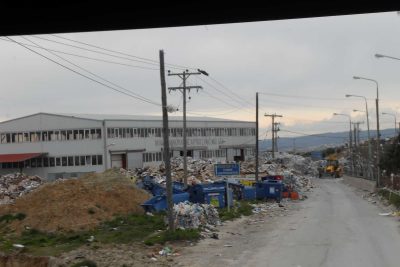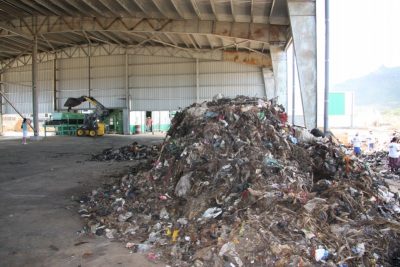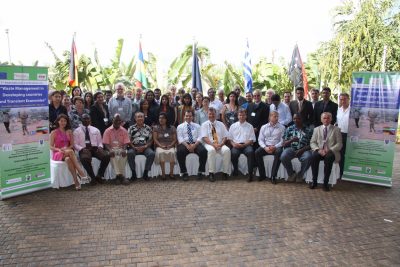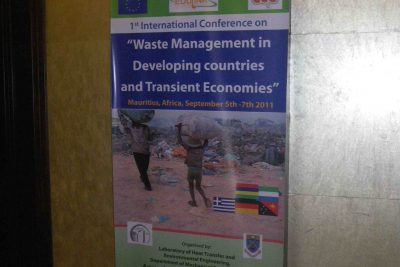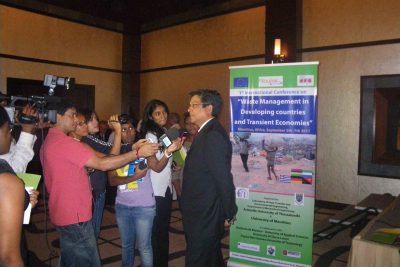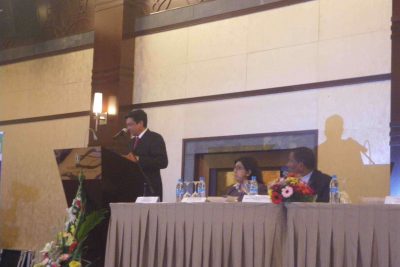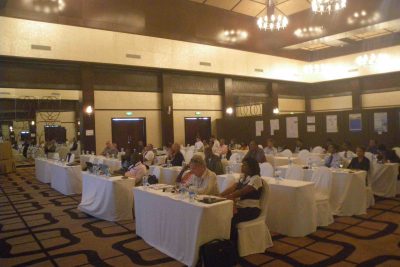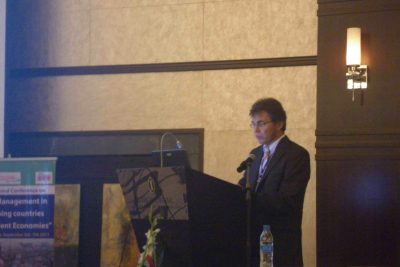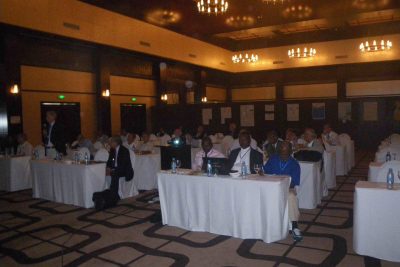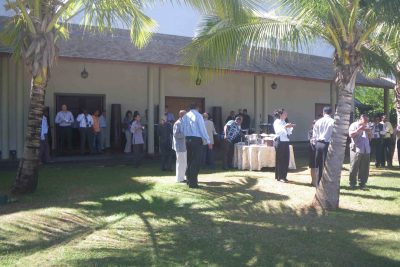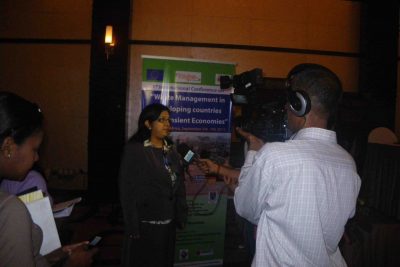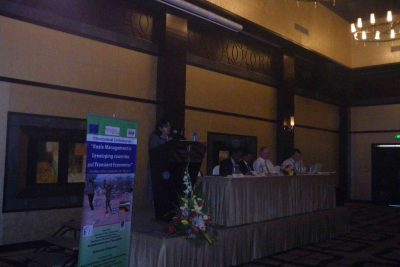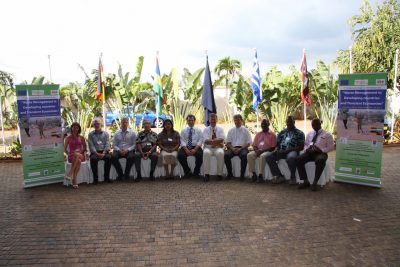CODWAP
COllaborative curriculum Development on Waste management in Africa and the Pacific region
Project duration: December 2008 – June 2012
Background
In African and Pacific countries, one to two thirds of solid waste generated is not collected, and collected waste is mainly disposed in uncontrolled dumpsites and/or openly burnt, polluting water resources, soil and air.
Five universities in Mauritius, Papua New Guinea, Sierra Leone, Greece and Germany will pool their knowledge to improve solid waste management (SWM) education and on-the-job vocational training. The project partners will develop educational tools that are customised, practical and suitable to the needs and priorities of African and Pacific countries. The goal is to improve capacities and awareness and behaviour on SWM issues from a lifecycle perspective among students, teachers, civilians, NGOs and other local stakeholders.
The project partners will design and implement a post-graduate programme in SWM and environmental protection in developing countries. Other key activities will include training missions, workshops and interactive seminars for civil servants, NGO representatives and public awareness campaigns for the wider public.

CODWAP - COllaborative curriculum Development on Waste management in Africa and the Pacific region - is a Specific Targeted Research Project of the ACP-EU Cooperation Programme in Higher Education (EDULINK) - A programme of the ACP Group of States, with the financial assistance of the European Union.
Objectives & Activities
The overall CODWAP objective is to foster co-operation between European and APR HEIs in the field of SWM and within each of the individual environmental and human health protection aspects and priorities, aiming to support the higher education system in accordance to the socio-economic needs and development priorities of APR States. Education and on-the-job vocational training in the SWM sector is of great importance, since the often rapidly increasing economic development and the population growth has lead to environmental and hygienic problems in many DC, especially Asia and South America, with urbanization in Mega cities, whereas APR DC are still at an earlier stage and therefore some potential still exists to learn from (and try to avoid / alleviate) such rapid-growth patterns.
Specific objective is the development of SWM educational tools for DC, which are customised, easy-to-use, practical and suitable to the needs and priorities of participating APR States, set around of a Master Course in the UoM on SWM in DC, as well as training courses in the EU and APR. These parallel educational activities are expected to have multiplier effects in a wide range of target groups; from students and professors (through the Master Course) to governmental and local authorities, SWM stakeholders and various other special groups (poor, homeless, women, scavengers, etc) through vocational training and public outreach / education campaigns.
The Activities, focused on SWM and related environmental protection, engineering and management in DC, aim to produce skilled scientists, upgrade university capacities, knowledge, awareness and skills of teaching staff. The aim is the existing know-how and the expertise of the 2 EU participating partners (in collaboration with 3 worldwide very prominent entities in this field from EU , US and Australia as associate partners), to be blended into and integrated with local APR educational systems. As parallel activities, training missions and seminars are expected to further put the finger on critical local SWM problems, identify and prioritize specific regional needs / gaps, and promote integrated and sustainable SWM in DC, by facilitating outreach, data collection, establishment of active contacts, raising awareness and promoting interactions and feedback.
Main Activities:
Master Course on SWM in DC
- faculty members enhancing their knowledge and skills.
- students understanding the need for environmental management and the main elements for its adoption.
- scientists assessing local socio-economic conditions for organising successful SWM programmes.
Curriculum development
- blending fully the experience of APR and non-APR members of the consortium.
- following a bottom-up, hands-on-problem approach and needs analysis.
Handbook ‚teaching SWM in ACP
- best practices and show cases.
- practical guidelines for SWM in DC, FAQs, enhanced learning.
- a roadmap for decision making and decision support at various levels (strategic, tactical, operational).
- utilisation of the International Waste Working Group’s worldwide networking.
International Conference ‚SWM in ACP‘
- dissemination of project results.
- encouragement of wider co-operation between EU and APR/other DC.
- promotion of sustainable, low-cost solutions, identification of milestones and bottlenecks, mitigation of commonly identified risks.
Training missions and courses
- Vocational training on project management and SWM in DC
- awareness/skill development workshops
- enterpreneurship promotion modules
- sustainable ‘pro-poor SWM‘ in social enterprises, handicrafts.
Project partners
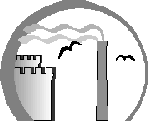
Aristotle University of Thessaloniki, Greece – project co-ordinator
Ast. Professor Avraam Karagiannidis
Laboratory of Heat Transfer and Environmental Engineering
Tel.: +(30) 2310 996011
Fax: +(30) 2310 996012
E-mail: makis@aix.meng.auth.gr

Bremen University of Applied Sciences, Germany
Dr. rer.nat. Martin Wittmaier
Institut für Energie und Kreislaufwirtschaft an der Hochschule Bremen GmbH
Tel.: +49 (0) 421 5905-2326
Fax: +49 (0) 421 5905-2380
E-mail: wittmaier@hs-bremen.de

University of Mauritius, Mauritius
Prof. Dr. Romeela Mohee
Mr. Haukim M Yasin
The Admission & Student Records Office
Tel.: +(230) 403 7743
Fax: +(230) 4657144
E-mail: y.haukim@uom.ac.mu

University of Technology, Papua New Guinea
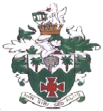
Fora Bay College, University of Sierra Leone, Sierra Leone
Prof. A.B. Karim
Associate partners

Griffith University, Australia

CalRecovery Inc., USA
www.calrecovery.com
Dr. Luis F. Diaz, President
Tel.: 1-925-356-3700
Fax: 1-925-356-7956
E-mail: ludiaz@calrecovery.com
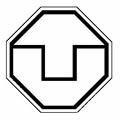
Technical University Dresden, Germany
Prof. Dr.-Ing. habil. B. Bilitewski
Institute for Waste Management and Contaminated site treatment
Tel.: +49 (0) 3501- 530030
Fax: +49 (0) 3501- 350022
E-mail: abfall@rcs.urz.tu-dresden.de
Target group
- HEIs: students, professors and staff
The main target group are the students (post- and under-graduate) and staff (teaching and supporting) of the participating HEIs. The setting-up and implementation of a comprehensive and targeted Master Course on SWM in DC (the first one of its kind world-wide), with also the prospect of a double diploma from the participating EU HEIs, will increase inter- and intrainstitutional networking, thus proving multilaterally beneficial to: a1) post-graduate students attending courses, lectures, workshops and the intended final project conference on sustainable SWM in DC; a2) under-graduate students updating curriculum by lectures from highly experienced and worldwide reputed professors/experts on SWM in DC; a3) faculty members expanding their knowledge via exchanging knowhow and experiences; a4) administrative staff of the participating HEIs obtaining and building administrative capacity via their involvement in Master Course’s organization.
- Governmental/ local authorities
- special social groups
- SWM stakeholders and professionals
On a broader yet still very direct level, various local and regional community groups will tangibly benefit from the proposed action including: b1) Governmental and local authorities, raising awareness and fostering osmosis on policy level; b2) SWM stakeholders, trade unions, industries, commerce and SMEs, benefiting by know-how acquired and linking HEIs to the local SWM labor market, as well as various local NGOs; b3) special community subgroups (usually socially isolated/marginalised and professionally un- or under-employed) usually involved in informal SWM or potentially to-be-involved in recovery operations and secondary product development, such as: b3a) women (incl. single mothers) from low-income social groups trained into waste sorting, composting, recycling and reuse as a means of professional reinstatement and additional income, both in urban and rural areas; b3b) refugees, asylum seekers, migrants, poor and homeless people that often are found to reside near dump-sites, make a living out of these on a regular basis, often under high and direct health and environmental risks; b3c) peddlers, pickers and scavengers getting integrated in the local systems and collaborating with local authorities and recyclable material collectors and dealers; and b3d) minorities (e.g. national, religious) that are often faced with societal exclusion and are becoming active in SW recycling, reuse and trading as a result.
Mauritius Conference
1st International Conference
on
„Solid Waste Management in Developing Countries“
Réduit, Mauritius, Africa, 5-9 September 2011
The International conference was mainly focused on the creation of linkages between scientists and Solid Waste Management stakeholders aiming to identify and local Waste Management issues and concerns.
The conference lasted five days and included oral sessions and a poster session as well as a study visit session during the last day.
The conference main topics covered experiences and new developments in waste management treatment and disposal methods of several waste streams along with horizontal issues and tools such as financial tolls, Health & Safety related issues, Industrial Ecology in developing countries, etc.focusing also in low and medium income countries.
Keynote speakers
- How to establish a waste management in Africa – pdf
- The management of MSW: An international overview – pdf
Session 1 / Day 1
Session 2 / Day 2
- material flow networks can help improving the operation of waste treatment plants – pdf
- Waste fee as an economic tool – pdf
- Future megacities – a challenge for waste management research – pdf
- Riskcycle – A new Challenge in the worldwide Trade of Recyclables and Recycled Products – pdf
- Process parameter variations during the co-composting of mixed filtercake, bagasse and vegetable wastes – pdf
- Domestic waste management: Composting control by oxyen content measurement – pdf
- Impacts of composts application on proberties of a dry soil – a lab scale study – pdf
- Investigating Nitrogen Fixation by Azotobacter in Soil – pdf
- Recovery of landfill gas under the conditions of landfills in developing countries – pdf
- Assessing and modelling solid waste collection costs and CO2 Emissions impacts based on the rising waste generation in Mauritius – pdf
- Reduction of Occupational Risks – Associated with the informal collection of Recyclable Materials – pdf
- Sustainable development of domestic waste in developing countries: Mahajanga case – pdf
Session 3 / Day 3
- Fermentation of waste and organic substrates from agriculture – technical possibilities and potential for the production of regenerative energy – pdf
- Exhaust gas emission from MBT-plants – a case study of MBT Cröbern – pdf
- Economic and ecological analysis of household biogas plants in China – pdf
- Modelling of a downdraft gasifier fed by agricultural residues – pdf
- Waste to energy plants as an opportunity for energy production to substitute fossil fuels and to avoid greenhouse gas emissions – pdf
- Comparison of energy option for waste – pdf
- Development of a model for the sustainable management of industrial areas in Greece – pdf
- Energy recovery by biological utilization of organic wastes from household and landfills – pdf
- Activities on mare chicose sanitary landfill – pdf
- Influence of carbon to Nitrogen ration on carboxylic acids production from mixed wastewater sludge and pretreated bagasse fermentation – pdf
- The use of compacted tropical clay treated with rice husk ash as a suitable hydraulic barrier material in waste containment applications – pdf
- Thermophilic solid state anaerobic digestion of MSW in sequential batch reactors – pdf
Downloads & Results
- Introduction to Solid Waste Management – pdf
- Mechanical, Biological and Thermal Waste Treatment – pdf
- Recycling and Resource Management – pdf
- Hazardous Waste Management – pdf
- Landfilling Final Disposal in Developing Countries – pdf
- Research Methods (ppt version) – pdf
- Mining Waste Management – pdf
- Sustainable Production Technologies – pdf
- Environmental Management Systems – pdf
- Special Waste Management – pdf
- International Environmental Law and Policy – pdf
- Environmental Economics – pdf
- Solid Waste Management Systems – pdf
- Poster – pdf
Leaflet
- Project Leaflet – pdf
Publications
- Chris A. Kobal (2012, Master Programme (MSc) on Solid Waste and Resource Management: A new Postgraduate Programme at UNITECH, Proceedings of the 5th Conference on Science and Technology, Pacific Adventist University, Port Moresby, Koiari Park, Monday 25th June – Friday 29th June. – pdf
- R. Mohee, A. Karagiannidis, N. Themelis And St. Kontogianni (2010), The mounting problems with managing wastes in rapidly developing islands: the Mauritius case, Proceedings Venice 2010, Third International Symposium on Energy from Biomass and Waste, Venice, Italy; 8-11 November. – pdf
Presentations
Funding
ACP-EU Cooperation Programme in Higher Education – A Programme of the ACP Group of States, with the financial assistance of the European Union.



Institut für Energie und Kreislaufwirtschaft an der Hochschule Bremen GmbH
-
Neustadtswall 30
28199 Bremen
Germany - +49 421 5905-2326
- office-iekrw@hs-bremen.de

